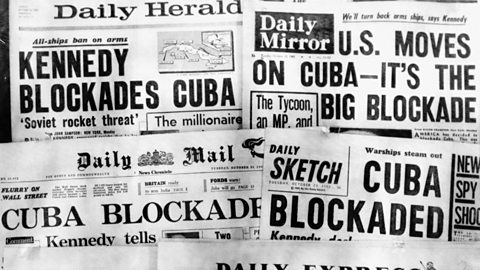Changes in the Soviet Union
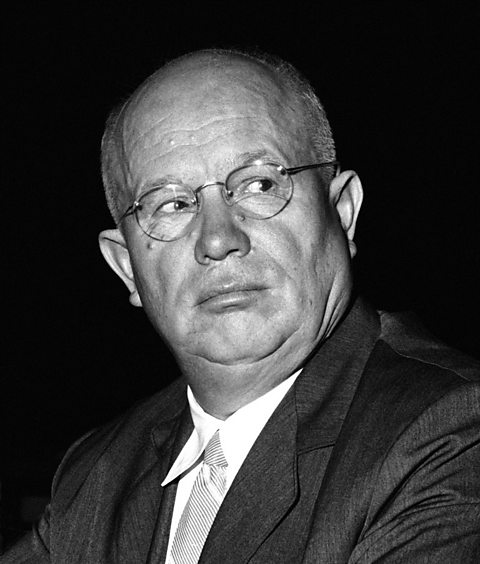
After Stalin’s death in 1953, there was a reaction against his dictatorship A country ruled by someone who has complete authority..
Nikita Khrushchev emerged as the new Soviet leader and he introduced a de-StalinisationReforms initiated by Krushchev after Stalin’s death to denounce his influence and make Soviet society less repressive. policy, which encouraged people in the Eastern blocCountries in Eastern Europe that were controlled by the Soviet Union, for example Poland, Hungary and Czechoslovakia. to think that greater freedoms might be possible.
However, there were clear limits to the freedoms Khrushchev would allow.
There was no possibility of countries in the Soviet sphere of influenceIn international politics, an area in which one nation holds, or claims to hold, dominant power over a country or several countries. leaving the Warsaw PactA collection of 12 communist countries that agreed to defend each other if one of them was attacked. or of changing their system of government from communismA system of running a country in which all means of production such as tools, factories and raw materials, are owned by the community as a whole. Private property does not exist and each individual contributes according to their ability and receives according to their needs. This means there is no hierarchy of social class..
This led to riots and demonstrations in Poland and Czechoslovakia and a full blown rebellion in Hungary in 1956.

Life in Hungary before the uprising
The Hungarian leader, who had been in control since 1949, was Mátyás Rákosi, a hard-line communist fully under the control of Moscow.
Rákosi’s secret police (the AVH) created a climate of fear and arrested anyone who spoke out or opposed communist rule.
Consequently, Hungarians had no freedom of speech and even something as simple as listening to Western music could lead to arrest.
Soviet presence
Thousands of Soviet troops and officials were stationed in Hungary, and they were a drain on Hungarian resources, leading to poverty.
In June 1956, the Hungarian people began to protest against Rákosi’s regime, and Moscow replaced him with Ernő Gerő.
He was no more popular and on 23 October 1956, students took to the streets and were supported by the workers and the Hungarian army.
Causes of the uprising in Hungary in 1956
- Nationalism: The Hungarians were very proud of their country and had a strong sense of identity.
- Religion: The Catholic religion had been banned under communistSomeone who believes in the political ideology of communism, a system of running a country in which all means of production such as tools, factories and raw materials, are owned by the community as a whole. Private property does not exist and each individual contributes according to their ability and receives according to their needs. This means there is no hierarchy of social class.rule and the Church's leader Cardinal Mindszenty was imprisoned.
- Poverty: Hungary was poor and yet much of its goods still had to be sent to the USSR.
- Oppression: Communist rule imposed censorshipThe examining of different forms of media and removing or suppressing parts considered to be unacceptable., secret police (AVH), control of education, Russian language.
- Western promises: Hungarians thought the UN or USA would support them if they rebelled.
- Death of Stalin – It was thought that Khrushchev might be willing to exert less control on the Warsaw PactA collection of 12 communist countries that agreed to defend each other if one of them was attacked. countries.
The events of the uprising and the USSR’s response
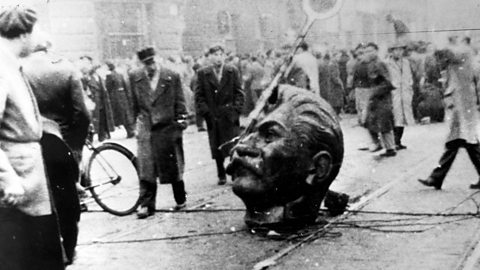
- 23 October 1956 - students took to the streets demanding reforms and were supported by the workers and the Hungarian army.
- 24 October 1956 - Soviets agreed to the formation of a new government under the leadership of the more liberal Imre Nagy - a popular communistSomeone who believes in the political ideology of communism, a system of running a country in which all means of production such as tools, factories and raw materials, are owned by the community as a whole. Private property does not exist and each individual contributes according to their ability and receives according to their needs. This means there is no hierarchy of social class. leader.
- 28 October 1956 - Soviet tanks withdraw from Hungary.
- 1 November 1956 - Nagy introduces reforms including leaving the Warsaw PactA collection of 12 communist countries that agreed to defend each other if one of them was attacked., declaring neutrality in the Cold War, the complete removal of Soviet troops from Hungary and holding free democratic elections.
- 4 November 1956 - 6,000 Soviet tanks crossed the Hungarian border. Bitter street fighting occurred and 30,000 were killed.

Questions
What happened to Nagy?
Nagy sought refuge in the Yugoslav Embassy but was captured and executed in 1958.
After the Hungarian uprising was crushed, Janos Kadar replaced Nagy and communistSomeone who believes in the political ideology of communism, a system of running a country in which all means of production such as tools, factories and raw materials, are owned by the community as a whole. Private property does not exist and each individual contributes according to their ability and receives according to their needs. This means there is no hierarchy of social class.control was reasserted.
However, some reforms were then introduced at this stage.
Why did the USSR react in the way they did?
The Soviets could not allow Hungary to leave the Warsaw PactA collection of 12 communist countries that agreed to defend each other if one of them was attacked. as such an action would leave a gap in the USSR's buffer zoneAn area giving someone protection against a threat, eg the USSR wanted a buffer zone around them after being invaded by Germany in both World Wars. with Western Europe.
Soviet security was Khrushchev's priority and so he decided to crack down on the new Hungarian government.
The response of the West
Although the West expressed sympathy for the Hungarian people, there was no attempt at intervention by the USA or Western Europe.
This was due to a number of reasons:
- Their attention was fixed on the Anglo-French invasion of Suez CanalA man made canal dug in Egypt to connect the Mediterranean Sea with the Indian Ocean in the 19th century..
- President Eisenhower was campaigning for re-election and was not interested in events in Hungary.
- The problem of getting access to Hungary, as Austria was neutralNot favouring either side in an argument or conflict. and NATONorth Atlantic Treaty Organisation - a military alliance of Western powers originally set up (in April 1949) to provide a counterforce to the Soviet armies of Eastern Europe. forces could not advance through it.
- Khrushchev threatened Britain and France with rockets if they attempted to intervene and it risked the possibility of war with the USSR.
- It was clear that the West was not prepared to attempt rollbackAn American policy to not just contain communism, but turn communist countries back to capitalism. of communismA system of running a country in which all means of production such as tools, factories and raw materials, are owned by the community as a whole. Private property does not exist and each individual contributes according to their ability and receives according to their needs. This means there is no hierarchy of social class. within the Soviet sphere of influenceIn international politics, an area in which one nation holds, or claims to hold, dominant power over a country or several countries. in Eastern Europe.
The consequences of the uprising
- Hungary was placed under strict communistSomeone who believes in the political ideology of communism, a system of running a country in which all means of production such as tools, factories and raw materials, are owned by the community as a whole. Private property does not exist and each individual contributes according to their ability and receives according to their needs. This means there is no hierarchy of social class. control.
- In Eastern Europe, there was the realisation that the USSR would not tolerate anyone attempting to break free from theWarsaw PactA collection of 12 communist countries that agreed to defend each other if one of them was attacked.. They also accepted that even if they remained loyal to communism, it had to be on the USSR’s terms.
- Events in Hungary were a clear warning to the other countries within the Soviet sphere of influenceIn international politics, an area in which one nation holds, or claims to hold, dominant power over a country or several countries. not to attempt any move towards independence.
Comparison
| The West | The USSR |
|---|---|
| The West accepted that the USSR was determined to keep a firm grip over Eastern Europe. | Khrushchev’s commitment to de-Stalinisation did not mean that communismA system of running a country in which all means of production such as tools, factories and raw materials, are owned by the community as a whole. Private property does not exist and each individual contributes according to their ability and receives according to their needs. This means there is no hierarchy of social class. would submit to capitalismA system of running a country where most businesses are owned by private companies or individuals, not the government.. |
| President Eisenhower faced criticism as he did nothing to aid the Hungarians. | Khrushchev was determined to maintain communist control at any cost. |
| The West was more or less powerless to influence events behind the Iron Curtain. |
Test your knowledge
More on International relations, 1945-2003
Find out more by working through a topic
- count5 of 13
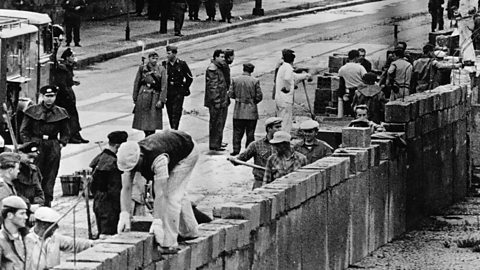
- count6 of 13
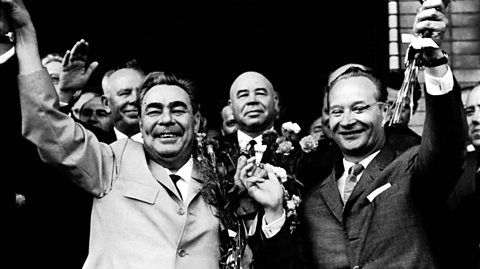
- count7 of 13
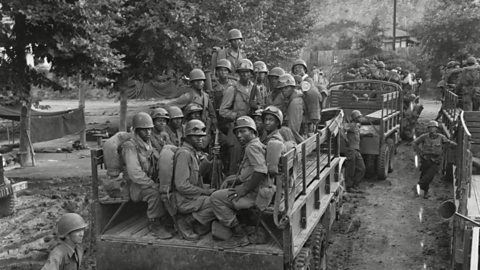
- count8 of 13
